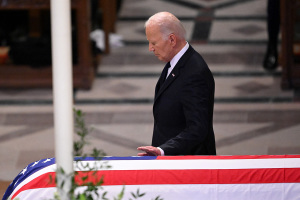Marriage Isn't Just About Love, Says Catholic League President: Scholars Agree
During a recent appearance on Current TV's "Viewpoints," Catholic League President Bill Donahue stated during a debate on same-sex marriage that love is not the basis for marriage, reiterating a previous argument based on what marriage is supposed to involve.
"Everyone knows in their right mind that the whole purpose of marriage is to have a family," Donahue told host John Fugelsang. "It's not about making people happy. It's not about love."
And while loving, committed relationships are important, that does not necessarily translate to marriage, he claimed.
A new book recently published entitled, "What Is Marriage? Man and Woman: A Defense," was written by Sherif Girgis, Ryan Anderson, and Princeton professor Robby George with the intention of getting to a deeper, philosophical understanding of what marriage is.
"What we have come to call the gay marriage debate," the three scholars wrote, "is not directly about homosexuality, but about marriage. It's not about whom to let marry, but about what marriage is."
The book details two opposing views of what marriage is and the characteristics of such a viewpoint.
One perspective of marriage is held under the traditional view, which the authors describe as the "conjugal view."
"The conjugal view of marriage has long informed the law– along with the literature, art, philosophy, religion, and social practice– of our civilization," the authors wrote.
"It is a vision of marriage as a bodily as well as an emotional and spiritual bond, distinguished thus by its comprehensiveness, which is, like all love, effusive: flowing out into the wide sharing of family life and ahead to lifelong fidelity."
The opposing viewpoint is referred to as the "revisionist view."
"It is a vision of marriage as, in essence, a loving emotional bond, one distinguished by its intensity– a bond that needn't point beyond the partners, in which fidelity is ultimately subject to one's own desires. In marriage, so understood, partners seek emotional fulfillment, and remain as long as they can find it."
The authors contend that laws need to be based on the conjugal framework of marriage, given that there are many public goods that benefit society when such a view is upheld and promoted. It also shows that marriage is not isolated to the couple, as it has far reaching implications within the larger society.
"Everything depends on marriage," George McCormick, professor of jurisprudence at Princeton University, previously said in a statement.
"Because it is the fundamental unit of society, the original and best department of health, education and welfare, supplying what every other institution in society needs, depends on, for its own flourishing, but which none of those institutions can supply for themselves."





























